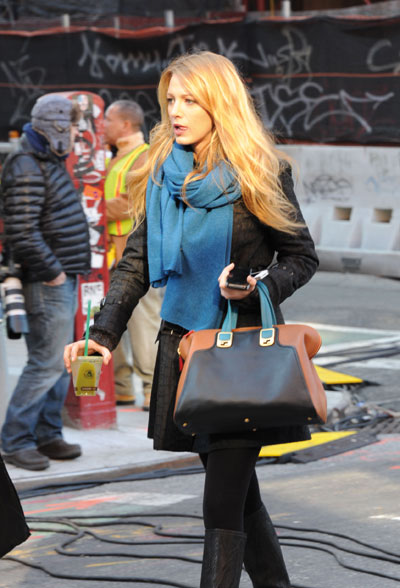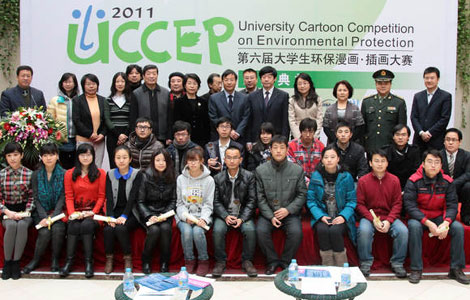Conspicuous consumption of luxuries on the rise
Updated: 2011-12-26 10:18
By Li Woke (China Daily)
|
|||||||||||
BEIJING - Tang Shan ran to her desk, screaming with delight when she saw the package containing her new dress had arrived.
|
 |
|
Blake Lively filming Gossip Girl on Essex Street in Manhattan, New York, on Dec 14, 2011.[Photo/Provided to China Daily] |
Tang, a 26-year-old graduate, spent 80 yuan ($12.50) on a fake white dress from the Internet that a character wore in the Gossip Girl series.
"I am a huge fun of Gossip Girl. I want to dress exactly like Jenny Humphrey (a character)," said Tang.
Gossip Girl is an American teen drama series based on the book series of the same name. Shown on CW Televsion Network from 2007, the series unveiled the everyday lives of privileged young adults on Manhattan's Upper East Side in New York.
Popular characters in the series include Serena van der Woodsen (Blake Lively) and Blair Waldorf (Leighton Meester), a longtime friend and occasional rival of Serena's. The two girls regularly feature and wear luxury brands such as Chanel, Prada and Stella McCartney in the series. Additionally, the show's star, Blake Lively, is Chanel's newest brand ambassador.
According to the China Market Research Group, nearly five million Chinese people watch each new episode of Gossip Girl on the Internet, because the show isn't broadcast on the country's TV network, and increasing numbers of young Chinese girls want to imitate TV stars by buying the expensive brands they publicize in their shows.
"In China, Gossip Girl is one of the most popular fashion series to date. Colors, textures and proportions were all used to incorporate fashion into every aspect of the show," said Wang Xiaoyuan, an editor with the Chinese version of Cosmopolitan magazine. "For sure, the series will influence Chinese young ladies' fashion tastes."
Kate Zhou Handbags in Dongzhimen, Beijing, displays dozens of US designer handbags in its windows at an average price of around 3,000 to 4,000 yuan.
"More than 50 percent of our customers are young girls who don't earn much but they want to spend a month's salary on a designer bag," said saleswoman Magy Huang.
According to a report published by World Luxury Association this year, total consumption in the Chinese mainland luxury market reached $10.7 billion in 2010, excluding private jets, yachts or luxury cars, making the country the world's second largest consumer of luxury goods following Japan.
Andy Kline, an international researcher for the World Luxury Association, said that because of yuan appreciation and the depreciation of the euro, the purchasing power of Chinese consumers in the international market has increased. In 2010, Asian people bought $69 billion luxury products from the European market, of which $50 billion was contributed by Chinese customers.
The World Luxury Association says China's appetite for luxuries is growing faster than that of any other country. China will become the largest luxury goods market and its sales volume will reach $14.6 billion in the next four or five years.
Research from Bain Capital, one of the world's leading business strategy consultancy firms, showed that in 2010 sales of luxury goods increased substantially year-on-year by 30 percent in China, while sales declined in Japan and the United States, the world's other top luxury goods markets.
"Some young Chinese girls want to show their privileged social status by dressing in labels," said fashion editor Wang. "Others like wearing designer clothes and dream of meeting their Prince Charming."
Sun Shijin, director of the Psychology Research Center at Fudan University in Shanghai, said: "A large number of Chinese consumers are still in a stage of conspicuous consumption. As China has achieved new heights in its economy and its society recently entered an era of mass consumption, the purchasing power of Chinese citizens is rising along with the development of the commodity economy. People sometimes lose their sense of reason when they pursue a material life. Conspicuous consumption during a period of social transition is an inevitable process of social development."
Geoffrey Miller, in his book, Spent: Sex, Evolution, and Consumer Behavior, wrote: "The conspicuous consumption by human females, especially for products such as Prada handbags and Manolo Blahnik shoes, is to compete to attract the higher-quality males. Sadly, the evidence so far suggests that men pay very little attention to such conspicuous consumption by women."
Related Stories
Hunger for luxury goods growing 2011-06-17 11:14
Craving for luxury goods 2011-01-14 10:14
Chinese boost to luxury goods 2010-12-13 10:51
Debate: Luxury goods 2011-07-11 07:57
Chinese boost to luxury goods 2010-12-10 08:00
Chinese boost to luxury goods 2010-12-10 08:00
- PBOC urges less reliance on foreign credit ratings
- Group-buying firms look to Taobao
- Bank reserves 'may be cut again next year'
- Surplus revenue is a taxing problem
- Provincial borrowers defer loan payments
- City to aid in Foxconn's recruiting
- China, Pakistan ink currency swap deal
- Families urged to rethink finances










